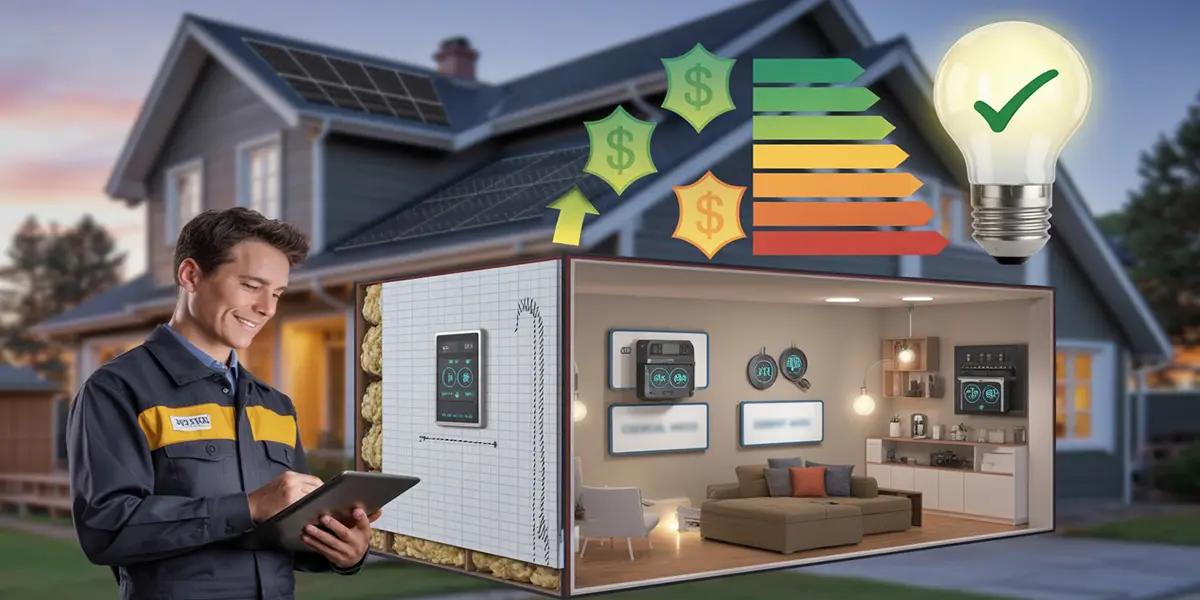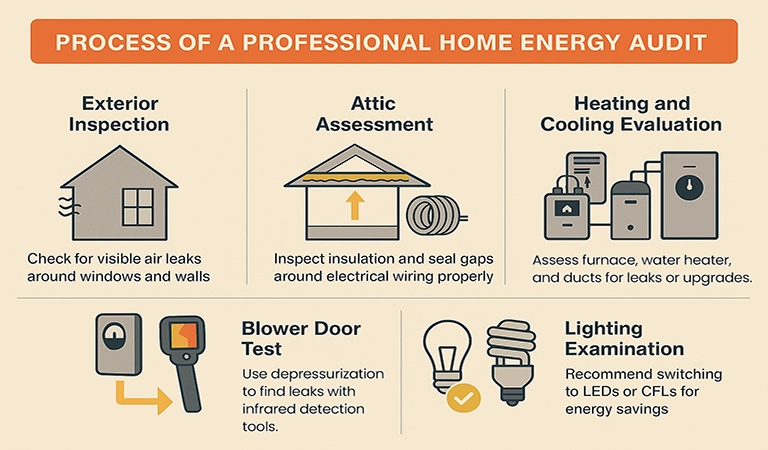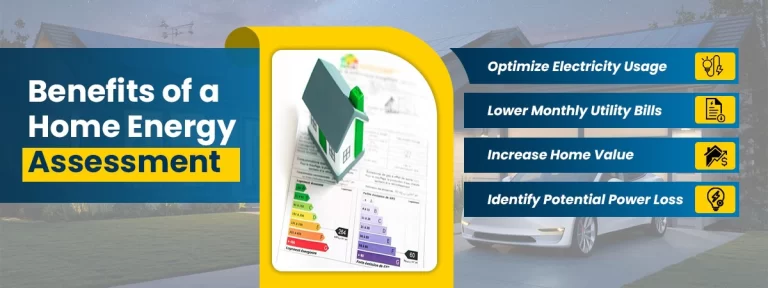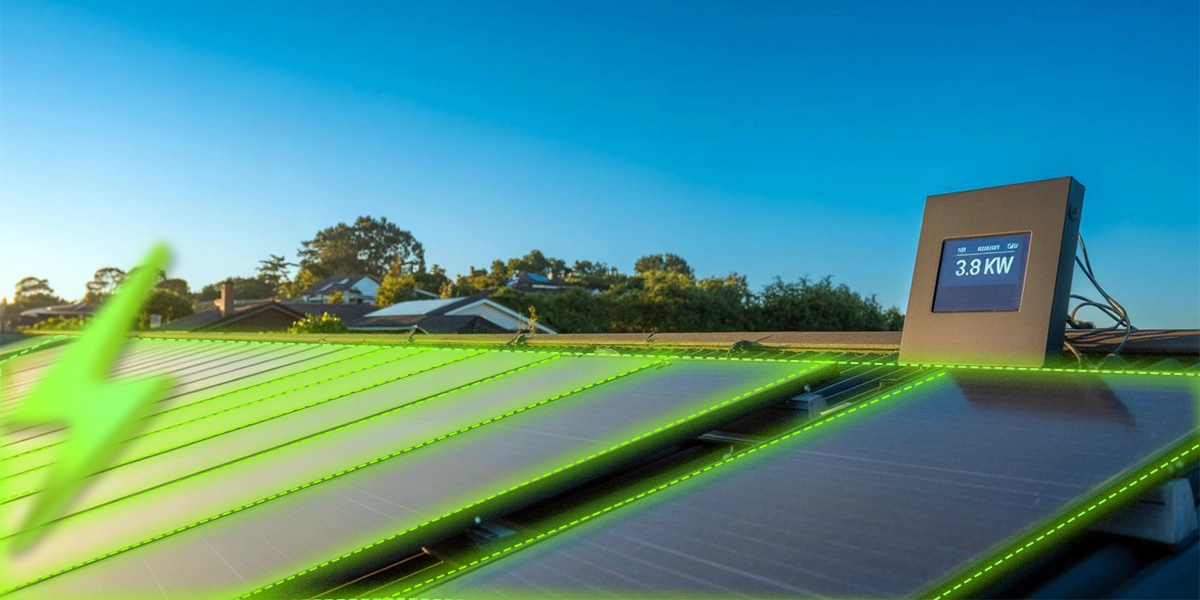- Updated On: June 23, 2025
Home Energy Audit: A Smart Way to Boost Efficiency and Cut Electric Costs
Considering energy-saving home improvements like installing solar panels at home or a smart panel is a wise decision nowadays. With these upgrades, you will not only lower your energy costs but also maximize energy efficiency by managing power usage. However, before proceeding to any power improvement, it is vital to conduct a home energy audit. A home energy assessment allows you to get insights into your home’s power usage, comfort, and safety. Also, you can analyze how much energy your house uses, where it is inefficient, issues and solutions you should focus on first. This energy efficiency audit is also the first step of your solar journey to identify a suitable system size for your home.

Energy audits for homes make them energy efficient and help you to save more on high electricity bills. In this article, we will guide you through everything a homeowner should know about these audits, the home energy audit process, and when you should consider a home energy assessment.
What is a home energy audit?
A residential energy audit includes a whole-house inspection that assesses how your home uses energy. A qualified home energy auditor will walk through your entire home and run several tests as part of an energy efficiency audit to identify opportunities where you may reduce the energy consumption of your house. After the inspection, the auditor will have a better idea of power consumption. This leads to determining the best energy-saving improvements for your home.
What is the process of a professional home energy audit?
The duration of a professional home audit may vary from 30 minutes to four hours, depending on the size of your house. A qualified energy auditor identifies the points of improvement using different tools and tests and provides you with a list of recommended upgrades and strategies to improve the efficiency of your house. Installing a hybrid solar system is among the popular solutions to reduce the high electric bills and maximize savings. The process of professional auditing includes.

Exterior Inspection:
A professional energy auditor will inspect your home from the outside. They will check windows, walls, and eaves, among other parts, to see if they can identify any significant problems causing leaks or power loss.
Attic Assessment:
If you have an attic, the auditor will go through it to look at a few things. Above all, they will check your insulation to ensure it is put uniformly and correctly between your walls. Additionally, they will assess whether the holes where electrical wires pass through are adequately sealed, as they might be a source of leaks.
Heating and Cooling Systems Evaluation:
Your water heater and furnace will be inspected by the auditor. Both may require an upgrade if they are older. To find any potential leaks where you might be losing heat and energy, they will inspect the connections in the ducts in your basement. Even while upgrading water heaters, furnaces, and appliances is expensive up front, they usually save money throughout the equipment’s lifetime. Upgrades often yield net savings within a few years.
Solar panel installation is a vital upgrade if you want to get rid of high energy bills and long power outages. Moreover, a 30% federal tax credit and other state incentives are available to offset the cost of going solar. You must consider this improvement if you want to make your home energy efficient.
Blower Door Test:
A blower door test is a common part of professional audits. They can find air leaks and check the quality of the air in your house with this test. All windows and doors are shut during a blower door test, and the house is depressurized using a blower door machine. An infrared camera is then used to find potential spaces for air sealing and leakage.
Lighting Examination:
Finally, the auditor checks your home’s lighting. You may quickly lower your electricity bills by just replacing your standard incandescent light bulbs with compact fluorescent lamps (CFLs) or light-emitting diodes (LEDs).
The suggestions your energy auditor provides for your house ultimately depend on the audit’s scope. Adding weather stripping, sealing air leaks from doors, or changing to more energy-efficient light bulbs are a few common improvements. Some more in-depth recommendations may include replacing drafty windows in your home, installing home solar panels and additional insulation, switching to ENERGY STAR appliances, upgrading to smart thermostats and smart panels like SPAN, or switching to a more energy-efficient HVAC system like heat pumps.
What are the benefits of a home energy assessment?
Performing an energy audit on your house has a lot of benefits, including:

Optimize Electricity Usage:
Reducing thermal leaks and energy waste reduces energy utilization. As such, homeowners can choose to improve insulation and purchase more energy-efficient appliances when replacing them, whether that’s a new refrigerator, air conditioning unit, or replacing old light bulbs with LEDs, all of which will also lower their carbon footprint.
Lower Monthly Utility Bills:
Energy audits identify ways to cut your energy use. When you take recommended actions, they will help reduce your electric bills. While installing solar panels on your roof is a great way to cut your electricity bill, choosing energy-efficient appliances costs less upfront and can make the solar array you need to power your home smaller.
Increase Home Value:
Undertaking energy audits and making recommended changes in your home makes it more efficient. This can increase the value of your home.
Identify Potential Power Loss:
New software programs can conduct house energy audits and identify potential energy use issues in your home. This can prevent any problems from worsening and save money on future solutions.
How much does an energy audit cost, and what do you save?
The cost of a professional energy audit depends on the size of your house. While some companies charge extra for larger homes, others provide fixed pricing. Residential customers may be eligible for free energy audits from some utility companies, nonprofits, or local government agencies. You can be eligible for additional rebates or incentives for energy-saving improvements like heat pumps or solar energy systems.
Even though an energy audit is a paid service, the initial investment and ongoing energy efficiency improvements will typically pay for themselves in the long run by lowering your electricity costs. According to the U.S. Department of Energy (DOE), you can actually reduce your energy costs by 5% to 30% with energy-efficient upgrades. And, if you switch to solar, the savings will be around 95% lower bills, energy independence for the future, and opportunities to earn from excess power through net metering.
Is a home energy audit worth it for you?
A DIY home energy audit is adequate for the majority of homeowners. Without paying for an assessment, you can find and apply energy-saving measures on your own, such as replacing light bulbs or weather-stripping doors. But if your house is older, you may need to think about getting help from an expert. Older houses are more likely to have mold and poor air quality than modern ones, and they also lose a lot more energy due to things like drafts. Overall, home energy assessments are always worth it to make an energy-efficient home.
As electricity costs and utility rates are rising, solar installation is the popular home upgrade for mitigating all energy crises. Solar SME is a top-rated solar installer near you for affordable residential and commercial solar services. You can book a free consultation or Get a Quote for an estimation of your solar savings.
Related Articles:
While solar power is an ideal solution to mitigate rising utility bills and long power outages, factors like roof direction, panel efficiency, and even weather changes, etc., may all affect the solar panel output. Explore tips to get most out of your solar system!
Solar PV loss, like shading, dirt, temperature effects, electrical issues, etc., may impact the performance and output of your system. Learn about the top solar PV losses, their causes, their impacts and practical tips to minimize these issues.
One of the most important priorities for homeowners looking to save on high energy bills and increase the value of their home is energy efficiency. Many states are also raising the stakes on how energy is produced. In this article, explore how you can make your home energy efficient.



